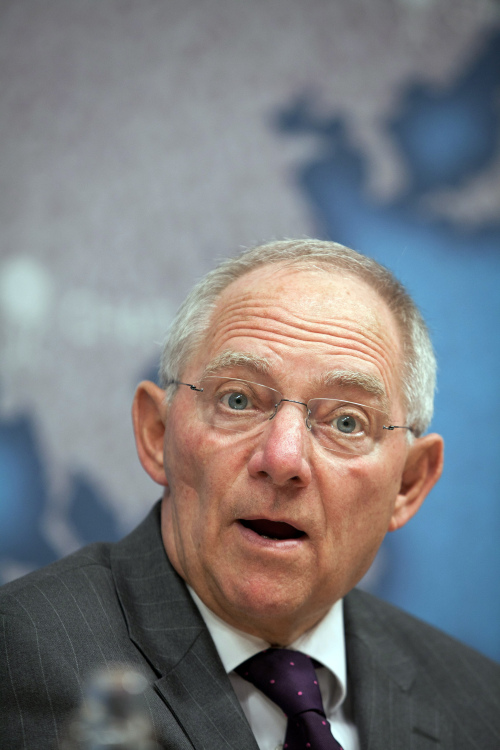German finance minister says no euro debt solution this weekend
Berlin dampened expectations Monday that an upcoming EU summit will finally provide a solution to the eurozone debt crisis, amid warnings that market instability is damaging the real economy.
Financial markets and the euro both rallied early Monday on optimism that European Union leaders were set to hammer out a final deal to rescue debt-laden Greece from bankruptcy in Brussels on Sunday.
But comments by German Finance Minister Wolfgang Schaeuble and Chancellor Angela Merkel’s top spokesman, Steffan Seibert, gave the markets a cold shower.
Speaking in Duesseldorf, Schaeuble said that while EU leaders were set to “provide cover for uncertainty in financial markets”, a permanent solution was unlikely to arise out of Sunday’s summit.
He also warned that markets must rapidly stabilize if Europe were to avoid damage to its real economy.
EU leaders are likely to agree on forcing banks to recapitilize as part of a comprehensive package to fight the growing debt crisis which is undermining the stability of the euro.
Seibert, speaking at a regular government news conference, also warned that measures agreed by leaders in Brussels would not immediately solve the crisis.
“Dreams that everything will be resolved and dealt with by next Monday cannot be fulfilled,” he said.
 |
Wolfgang Schaeuble, Germany’s finance minister (Bloomberg) |
Decisions to be reached on Sunday will be part and parcel of “important working steps on a long path that will reach into next year,” he added.
He declined to go into details, saying that EU governments were still working on the details of a deal.
But Merkel will address parliament later in the week, probably on Friday, to outline her government’s priorities, he said.
London’s benchmark FTSE 100 index closed down 0.54 percent, Frankfurt’s DAX 30 lost 1.81 percent and in Paris the CAC 40 dropped 1.61 percent.
The euro reached an intra-day high of $1.3914, before tumbling to $1.3763. That was down from $1.3881 in New York on Friday.
On Wall Street, the Dow Jones Industrial Average slid 1.39 percent in midday trade, the S&P 500 1.39 percent and the tech-heavy Nasdaq 1.54 percent in early trade.
Under intense pressure from their international partners at a meeting of G20 finance ministers and central bankers in Paris at the weekend, Europeans pledged to deliver at this weekend’s summit.
French Finance Minister Francois Baroin said “the results of the Oct. 23 summit will be decisive.”
German officials are usually more cautious in their statements, while the tone elsewhere in Europe was more urgent.
“I am hoping for a unanimous decision by governments to respond to this urgent situation,” European Commission President Jose Manuel Barroso said.
“I’m noticing that there is an awareness that this is a very critical moment and of the need for a decisive answer,” he told France’s BFM radio.
Barroso reaffirmed the commission’s proposal to face the eurozone crisis by using the 440-billion-euro ($600 billion) European rescue fund to keep the crisis from spreading from peripheral countries like Greece to core economies like Spain or Italy.
Barroso said EU states were against increasing the fund’s size, but that several technical solutions were being floated to increase the fund’s firepower.
The fund’s breadth could be leveraged “not necessarily by turning the fund into a bank,” but by using existing capital as a guarantee, Barroso said.
France is thought to prefer turning the fund, the European Financial Stability Facility, into a bank, something that Germany opposes.
For Greek Prime Minister George Papandreou the eurozone faces its “most critical week” ahead of the summit.
The week ahead “will determine the fate of the eurozone”, Papandreou said, warning of prolonged “insecurity” unless definitive decisions are taken.
Greece has been kept waiting for two months for a slice of bankruptcy-saving funds, part of a 110-billion-euro loan from the EU and the International Monetary Fund contracted last year.
Accused by its peers of dragging its feet over tough economic reforms promised in return for the money, Athens has gone into spending cuts overdrive this past month, pushing through new austerity legislation that has caused widespread protests.
At the weekend, G20 finance chiefs welcomed Europe’s efforts but made it clear more needed to be done.
“We look forward to further work to maximize the impact of the (European bailout fund) in order to avoid contagion,” they said in a joint statement.
U.S. Treasury Secretary Tim Geithner said they “heard encouraging things from our European colleagues in Paris about a new comprehensive plan to deal with the crisis on the continent.”
However, Geithner warned that the plan must include measures to ensure that European governments could borrow at sustainable interest rates, a broad recapitalization of banks and further support for debt-riddled Greece.
“The plan has the right elements,” he said, but added: “They clearly have more work to do on the strategy and the details.”
Also Monday Portugal, another eurozone country forced to adopt tough austerity measures as conditions for its bailout, announced that the floundering world economy will lead the Portuguese economy in 2012 “to a contraction of gross domestic product of 2.8 percent, following 1.9 percent this year.” (AFP)


![[Exclusive] Korean adoptee sisters meet for the first time in 39 years](http://res.heraldm.com/phpwas/restmb_idxmake.php?idx=644&simg=/content/image/2024/10/26/20241026050128_0.jpg)


![[Herald Interview] Love for K-drama, food defines 'Secret Ingredient'](http://res.heraldm.com/phpwas/restmb_idxmake.php?idx=644&simg=/content/image/2024/10/27/20241027050066_0.jpg)


![[Photo News] Rallying against LGBTQ+](http://res.heraldm.com/phpwas/restmb_idxmake.php?idx=644&simg=/content/image/2024/10/27/20241027050178_0.jpg)